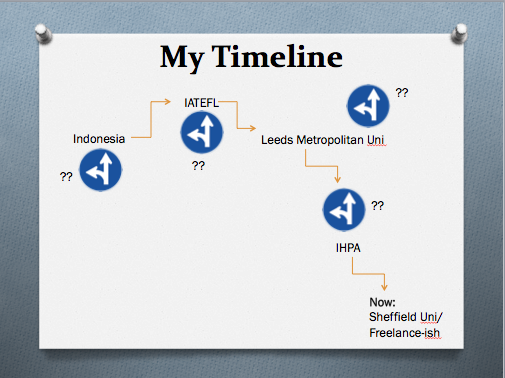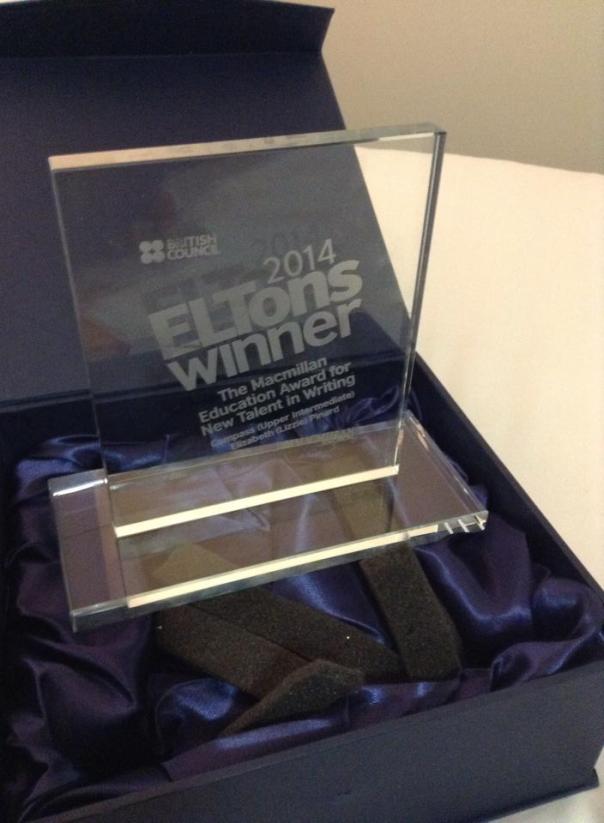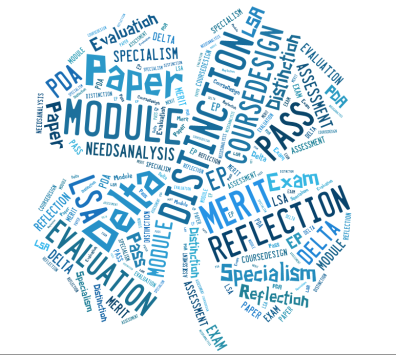It seems hard to believe that a little over five years have already passed since I handed in my dissertation project and left the world of M.A. behind. Five years is a good length of time. Five years is enough to really appreciate the difference doing my M.A. has made…
When I decided to do my M.A. ELT with integrated Delta, I had returned to the UK after teaching English abroad with the intention of doing a PGCE and getting a “proper job”. I applied to do a PGCE in primary and the university (no names mentioned) who I had applied to as my first choice dealt so poorly with the application process that I considered it a narrow escape when I wasn’t accepted onto the course! During that process, I attended IATEFL for the first time, as I had won a scholarship to do so (whoop!). Other than being badly bitten by the conference bug, I also got a flyer for an M.A. ELT/Delta in my conference bag. At the time, I thought it sounded interesting but was already in the middle of the PGCE application process. Later, having escaped from the PGCE path, I remembered that flyer, dug it out and started googling. The rest is, as they say, history; carefully documented on my M.A. ELT/Delta page.
So, what did I gain from dedicating a year of my life to pursuing two qualifications simultaneously?
The first thing that comes to mind is a geeky interest in learner autonomy. This came about as a result of the M.A. module on Multimedia and Independent Learning. Interest on its own, though, isn’t really enough to make much of a difference. What did make a difference was learning how to explore that interest after I finished the course. This, of course, I gained from the research module in which we learnt about different types of research including action research. Subsequently, while working in Sicily, I carried out action research projects focused on exploring different ways of helping learners become autonomous in their study. I remember one of my tutors had a look for me at the questionnaires I made to get feedback from my learners – still supportive even though I wasn’t a student anymore! I have since written up these projects – in real time on my blog and subsequently both as a book chapter for LT SIG’s recent edited book Teaching English reflectively with technology and as part of an article published in the journal Innovation in Language Learning and Teaching, entitled Looking outwards: using learning materials to help learners harness out-of-class learning opportunities. In order to write these texts, I used writing skills developed during my course. Prior to that, the last time I had written academically was for my undergraduate degree and it mostly seemed to involve quoting verbatim various bits of text in a very wordy way. During the M.A. and Delta, however, I was allowed, nay encouraged, to develop my own voice and (you may not believe it 😉 ) write a lot more concisely, as well as to master that notoriously tricky skill – paraphrasing. Helpfully enough, one of the M.A. modules, Methodology in Context, was assessed through the process of drafting, receiving feedback on and redrafting before finally submitting, a journal article modelled on ELT Journal requirements. I’ve yet to be published in the ELTJ but that process set me up nicely to be able to take advantage of the opportunities for publication that have come my way. Most recently, I’ve been working on a book chapter that will be published in the forthcoming Routledge Handbook for Materials Development in ELT.
Other than writing, another way of sharing my ideas and projects has been through doing presentations at conferences. This is another skill that my M.A. helped me to begin to develop, together with the confidence to put it into use. The research module was assessed partly by a write-up of the research but also partly through a presentation. Likewise, the materials development module required a presentation as well as a written rationale for the materials made and the materials themselves. The first presentation, I did, however, was for the M.A. module which reflected the Delta module 3. We had to do a presentation about the course syllabus we had made and the research we had done in order to write the accompanying essay. That first presentation was, er, well it wasn’t terrible, I got 67 or 68, but while the content was fine, my delivery was what let me down. The feedback I received, though, enabled me to develop the skills necessary to get into the distinction band for the research and materials development module presentations. Coming back to the conference side of things, we were encouraged, and given all the support we needed, to present at the Warwick University Postgrad Conference and at a MATSDA conference too. At the former, I presented again about my research module findings (my first ever conference presentation!) and at the latter I presented findings from a very small-scale bit of research into student material developers’ perceptions of the role enjoyment has played in the materials they develop and in their experience of language learning. Although this project wasn’t part of my assessment, my tutors were very helpful and supportive throughout the process. Since then I’ve gone on to talk at IATEFL on a number of occasions as well as delivering online webinars.

My first IATEFL presentation: talking about the materials I made for my dissertation project!
But what about TEACHING I hear you say… Well, this blog post gives an insight into 30 things that I learnt about, which have influenced my practice. Then, of course, Module 2 of the Delta and its mirror module on the M.A. transformed me as a teacher. From the former, of particular value, I believe, were the PDA and the Experimental Practice components, as, in complementary addition to the changes that the LSA process brought about in my teaching at the time, they gave me the tools needed for continuing development of my practice through principled reflection and experimentation. The M.A. mirror module, meanwhile, required us to do a great deal of peer observation, using tasks which became part of the portfolio we had to produce, to guide that observation; again, a really useful learning process. Another way in which doing this course has helped me in my work as a teacher is the aspect of content. By this I mean that developing my own academic skills during my M.A. means I have a high level of content knowledge which feeds into the lessons I teach as an EAP teacher. Things like paraphrasing, citation and referencing, macro and micro structure of different academic texts, academic grammar (e.g nominalisation, “that” clauses for reporting etc.) and vocabulary. Having gone through the process of developing an academic voice myself, I have an understanding of what my students will have to go through as they develop theirs and of the role that feedback plays in this. Finally, in the Multimedia and Independent Learning module, I learnt about such useful tools as wordandphrase.info a corpus tool that now has an academic sister site wordandphrase.info/academic which I use, help my students to learn how to use and show/recommend to the students I see in one-off one-to-one writing advisory sessions.
As well as what takes place in the classroom, part of teaching is the ability to evaluate, adapt and design materials for use with the students. This is another skill that I developed over the course of my M.A. ELT/Delta, in particular during the materials development module, for which the assessment was, as earlier mentioned, to produce and rationalise (in writing and via presentation) a set of materials. (These materials can be found here.) I was also lucky enough to be able to produce and rationalise (in a piece of extended writing) a set of materials for my dissertation project, which gave me extra scope to build on what I had learnt in the materials development module. Indeed, I learnt a huge amount about the task-based learning, intercultural communication and language awareness approaches, as well as using feedback on the materials I made for that module to refine the skills I had begun to develop. My dissertation project materials went on to win the 2014 ELTon Macmillan Education award for new talent in writing and consequently be published on Onestopenglish website.

A rather exciting evening…
The publishing process then saw me working with Macmillan Onestopenglish editors to adapt the materials to make them suitable for publication, which in itself was a great learning experience.

The first few lessons of my dissertation project materials – one of the changes that had to be made was breaking down each of the six task modules into two lessons.
Happily, I’m now able to use those skills of evaluation, adaptation and rationalised, principled creation of materials in my current role as ADoS here at the USIC arm of the University of Sheffield’s ELTC, and I thoroughly enjoy it! I’ve contributed and continue to contribute to the core materials for our programme, as well as making lots of supplementary material for myself and other teachers to draw on alongside the core materials.
To return to my original question, “what did I gain from dedicating a year of my life to pursuing two qualifications simultaneously?”, it seems clear the answer is a huge amount. To anyone considering doing an M.A., I would wholeheartedly recommend it. To summarise it, on a more basic level, doing my M.A. ELT/Delta has enabled me to develop professionally in a variety of enriching ways and helped me on my journey towards working at Sheffield University ELTC which had been my goal since I did my CELTA here back in 2008-2009. Of course there are lots of different M.A.s out there, with different focuses, different modules offered and so on. I think in order to find the right fit for you, you need to be clear about what you want out of it. For me, the best thing about mine was how practical it was both in terms of content and assessment, with the content providing a mixture of knowledge and skills and the assessments being modelled on real life use of those skills.
Here’s to another five years of learning and building even more on what I learnt in my M.A./Delta and during the first five years following it. (Now I feel really old…) Meanwhile, I would be really interested to hear from you if you have done an M.A. and/or Delta – what did you get out of yours? Use the comments box below to share your story too. Hopefully in due course this post and comments of that nature could prove a useful resource for people thinking about doing an M.A. and/or Delta in future. 🙂





































